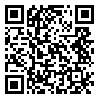

BibTeX | RIS | EndNote | Medlars | ProCite | Reference Manager | RefWorks
Send citation to:
URL: http://jdisabilstud.org/article-1-3281-en.html
Abstract
Background & Objective: Among the factors that have played an important role in family disputes in recent years is the cheating of one of the spouses (mainly by the man) on the other. In a healthy family, the husband and wife are committed to the principles of the family and each other, and their relationship is based on equality and human values. Infidelity is any sexual, emotional, or cognitive relationship outside the framework of marital relationships that takes place secretly. There is a risk of infidelity in most marriages, and in case of infidelity, the couple will face many problems.
Cognitive–behavioral therapy is one of the most popular approaches in treating many disorders and dysfunctions. The fundamental principle of cognitive–behavioral approaches is that cognition is effective on feelings and behavior. In this treatment, the patients are helped to recognize their distorted thinking patterns and ineffective behaviors and gain insight. Regular discussions and organized behavioral assignments are used to change these thoughts. In this method, behavioral techniques include avoiding stimulating situations, changing the response to stimuli, and giving new responses. Using muscle relaxation methods during anxiety and aggression is also one of the other treatment techniques. Using cognitive methods, clients can identify and replace negative and ineffective thoughts with appropriate ones.
In addition to cognitive therapy, drug therapy can also be effective in reducing the symptoms of anxiety and aggression. The purpose of this research was to compare the effectiveness of cognitive–behavioral therapy and the combination of cognitive–behavioral therapy and drug therapy on the anxiety and aggressive behaviors of women who have been betrayed.
Methods: This research is quasi–experimental. The study population included all women referred to the counseling center in Tonekabon City, Iran, in 2021. From this population, 30 women who had high anxiety and aggression, based on the anxiety and Ahvaz aggression tests, were entered into the study, and divided into two groups of 15 people. Fifteen women received both cognitive–behavioral therapy and drug therapy, and another 15 received cognitive–behavioral therapy alone. The study data were obtained using the Ahwaz Aggression Questionnaire (Najariayan et al., 1999) and the Cattell Anxiety Questionnaire (Cattell, 1957). Cognitive therapy sessions included eight 90–minute sessions. After the sessions, the anxiety and aggression of the subjects were measured again, and the data were analyzed using covariance analysis.
Results: The results showed a significant difference between cognitive–behavioral therapy alone and combined with drug therapy regarding anxiety (p<0.001) and aggression (p<0.001) of betrayed women. The effect sizes of anxiety and aggression were 0.68 and 0.52, respectively.
The findings showed that the combination of cognitive–behavioral therapy and drug therapy more reduced the anxiety and aggressive behaviors of betrayed women compared to cognitive–behavioral therapy alone (p<0.001).
Conclusion: Therefore, it is concluded that the method of combining cognitive–behavioral therapy and drug therapy is effective in reducing anxiety and aggressive behaviors of betrayed women.
| Rights and permissions | |
 |
This work is licensed under a Creative Commons Attribution-NonCommercial 4.0 International License. |


